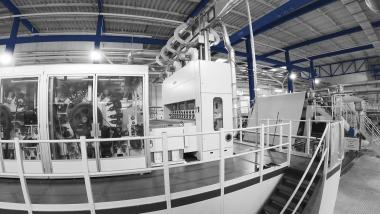Sustainable production technology from BRÜCKNER
- Long-term partnership between the Austrian textile producer FEINJERSEY and the German textile machinery manufacturer BRÜCKNER
The Feinjersey Group is an internationally operating textile company and supplies the "global players" of the textile industry worldwide. The value chain of the company, which is based in Götzis, Austria, ranges from yarn processing to the finished product.
As a fully integrated production company, the internationally active textile company Feinjersey attaches great importance to a high quality standard and guarantees care at every step in the process chain. With approx. 250 employees and annual sales of around 45 million euros, the company knits, dyes and finishes top-quality knitted fabrics as well as elastic woven fabrics for a wide range of applications.
Products are made for the fashion, sports, workwear and technical textiles sectors. Among other things, fabrics for the automotive industry, laminating backings and coating substrate for artificial leather or foils, construction textiles or fabrics for medical technology are all produced.
The Austrian textile manufacturer has been certified with the Bluesign textile seal and ensures efficient use of resources with modern machinery. Water and energy consumption as well as pollutant emissions are to be reduced to a minimum.
In textile finishing in particular, the focus is on minimising energy consumption as this process is the most energy-intensive in the entire process chain. Feinjersey uses its own photovoltaic system for this purpose, as well as the heat recovery and exhaust air purification systems on the stenter frames. By using the waste heat from production, the company's buildings are heated. All six stenter frames at Feinjersey are made by BRÜCKNER and produce with three-stage heat recovery and exhaust air purification systems.
The latest BRÜCKNER line has a working width of 4.20 m and is mainly used for the finishing of high-ly elastic and extremely sensitive knitted fabric. In order to avoid yellowing on the fabric, the stenter is equipped with an indirect gas heating system. The knitting oil vapours coming from the fabric during the heat-setting process are extracted from the dryer and cleaned in a BRÜCK-NER ECO-AIR exhaust air cleaning system before being extracted to atmosphere. The complete exhaust air treat-ment on the newest stenter is carried out by a multistage BRÜCKNER ECO-HEAT and ECO-AIR system.
Brückner Trockentechnik GmbH & Co. KG












